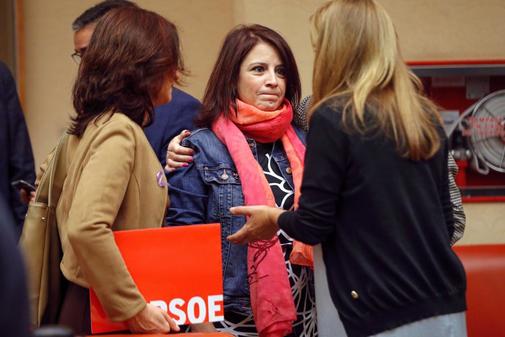- Royal Decree.The Government may close websites without a court order
- PNV and Podemos. Pedro Sánchez's partners guarantee a statute that throws Spain out of the Basque Country
The new Congress that will be constituted on December 3, with 16 parliamentary forces, is already anticipated as the perfect scenario for political and ideological chaos and the same happens, if it is finally formed, the future PSOE-United coalition Government We can. The validation in the Permanent Deputation of the royal decree by which urgent measures are taken for reasons of public security in the area of digital administration, public sector contracting and telecommunications, has shown this. Nothing is what it seems in the Chamber, the positions are changing, the allies and the adversaries, too.
The royal decree, really designed to short-circuit the so-called Catalan digital republic and curb the proliferation in the network of subversive dye movements against the State, has finally seen the light thanks to the approval vote of PSOE, PP and Citizens, enough to knock down the overwhelming rejection of the potential allies of Pedro Sánchez - independent and nationalist - and of Vox, and the abstention of his future government partner, United We can.
The cracks in the Sanchez backup block are becoming apparent. The representatives of the purple formation, in principle contrary to the decree, had to maneuver by presenting proposals for modifying the text to the Socialists in order to find an argument that would allow them to justify a change in their position and move from voting against abstention.
Jaume Asens, leader of the Commons in Congress argued the position of United We can emphasizing the need to "cooperate [with the PSOE] despite the differences that exist and that," he admitted, "will not disappear." However, he insisted: "We will have to agree on the disagreements that will arise during the term."
The criticisms that Nadia Calviño, acting Minister of Economy and future Vice President of the Government that Sánchez aspires to build with Pablo Iglesias, have had to hear have been very hard and have come precisely from those to whom the Socialists consider their preferred support.
The deputy of ERC Monserrat Bassa, representative of the political force whose abstentions are essential to carry out the investiture of Sanchez, did not hesitate to qualify the decree of "digital gag law" that, however, will not be enough, he warned, "to curb the outrage of the Catalans ".
"We are not clear," Bassa said, "where they want to go with this repressive offensive, but there will be no political stability as long as they do not politically address those conflicts that are political in nature." And to top it off he added: "We ask for his withdrawal for the rights and freedoms of Spanish sovereignty and for pure democracy."
The representative of JxCat, Laura Borrás, crossed out the decree of "digital coup d'etat of a technophobic state that protects itself against citizens." "It is the digital Corcuera law," he added, "the law of the kick in the server without a court order" which, in addition, he stressed, is approved "roughly in time of discount in a failed legislature."
The PNV also expressed its radical opposition. His deputy Mikel Legarda warned that either the Government agrees to "redirect" this royal decree soon or "the willingness of the PNV to collaborate with the PSOE will be seriously compromised."
In similar terms, of frontal rejection, the representatives of Bildu and Compromís expressed themselves. Vox was added to all of them, a party for which a decree of this type will leave the possibility of curtailing citizens' rights and freedoms in the hands of a government, in which the communists of Podemos will have a place.
Finally, the PSOE only found support, but also truffled criticism and reproaches, in the PP and in Citizens. The spokeswoman for the popular in Congress, Cayetana Álvarez de Toledo, explained the decision of her group to vote in favor of the validation of the decree on the need to guarantee the security of the State and the Spaniards in the face of threats such as those that the independentismo installed in the Catalan institutions acting without control in the network.
However, Álvarez de Toledo described it as "amazing" that the Government wants to "hide" that the decree has as its main objective "to end the digital republic of Catalonia". "They don't say it," said the deputy, "because they are negotiating with them, with the seditious."
According to the criteria of The Trust Project
Know more- PSOE
- United We Can
- PP
- Citizens
- Pedro Sanchez
- Vox
- PNV
- We can
- Pablo Iglesias
- Nadia Calviño
- ERC
- Commitment
- Cayetana Álvarez de Toledo
- Catalonia
- Bildu
- Politics
- Congress of Deputies
General elections 2019Elections: Pedro Sánchez and Pablo Iglesias reach a government agreement with the leader of Podemos as vice president
Spain Pedro Sánchez fails in his plebiscite and Vox shoots at the expense of Citizens
General elections 2019 Arnaldo Otegi asks Pedro Sánchez to negotiate the right of self-determination to facilitate his Government

